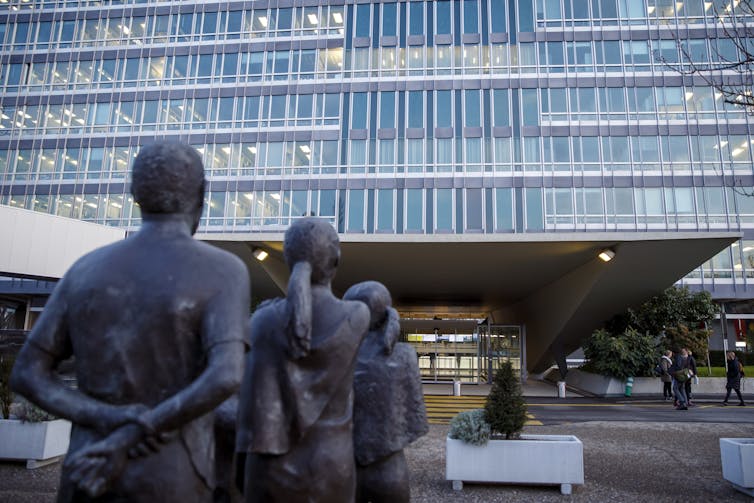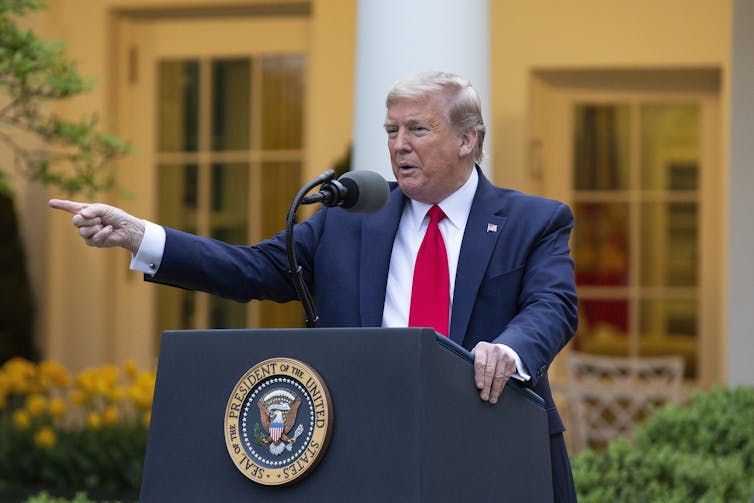An irony of the situation is that the international health authority has been criticized for decades for being too influenced by the U.S., writes Adam Kamradt-Scott.

WHO Director General Tedros Adhanom Ghebreyesus in 2018. (ITU, D.Procofieff, Flickr)
By Adam Kamradt-Scott
University of Sydney
 U.S. President Donald Trump has announced the U.S. is cutting its funding to the World Health Organisation (WHO) – a decision that will have major implications for the global health response to the coronavirus pandemic.
U.S. President Donald Trump has announced the U.S. is cutting its funding to the World Health Organisation (WHO) – a decision that will have major implications for the global health response to the coronavirus pandemic.
The U.S. contributes more than $400 million to the WHO per year, though it is already $200 million in arrears. It is the organization’s largest donor and gives about 10 times what China does per year.
Trump has accused the organization of mishandling and covering up the initial spread of Covid-19 in China, and of generally failing to take a harsher stance toward China.
What will Trump’s decision to cut funding mean for the organization?
WHO Membership
The WHO was established in 1948 to serve as the directing and coordinating authority in international health. It was created with a mandate to improve the health of the world’s population, and defined health as
“…a state of complete physical, mental and social well-being, and not merely the absence of disease or infirmity.”
While various civil society, industry and faith-based organizations can observe WHO meetings, only countries are allowed to become members. Every May, member states attend the World Health Assembly in Geneva to set the WHO’s policy direction, approve the budget and review the organization’s work.
Currently, there are 194 WHO member states, which means the organization has one more member state than the United Nations.

WHO headquarters in Geneva. (Salvatore Di Nolfi/EPA)
How is WHO Funded?
The WHO receives the majority of its funding from two primary sources. The first is membership dues from countries, which are described as “assessed contributions”.
Assessed contributions are calculated based on the gross domestic product and size of population, but they have not increased in real terms since the level of payments was frozen in the 1980s.
The second source of funding is voluntary contributions. These contributions, provided by governments, philanthropic organizations and private donations, are usually earmarked for specific projects or initiatives, meaning the WHO has less ability to reallocate them in the event of an emergency such as the Covid-19 pandemic.
Have Countries Pulled Funding Before?
Over more than 70 years of operations, a number of countries have failed to pay their membership dues on time.
At one point the former Soviet Union announced it was withdrawing from the WHO and refused to pay its membership fees for several years. When it then rejoined in 1955, it argued for a reduction in its back dues, which was approved.
As a result of nonpayment of assessed contributions, we have seen several instances where the WHO has been on the verge of bankruptcy. Fortunately, governments have usually acted responsibly and eventually paid back its fees.
Has There Been Political Criticism Before?
Yes. In 2009, the WHO was accused of acting too early in declaring swine flu a pandemic, in part over concerns it had been pressured by pharmaceutical companies.
Five years later, the organization was accused of acting too late in declaring the West African Ebola outbreak a public health emergency.
Trump has criticized the WHO for not acting quickly enough in sending its experts to assess China’s efforts to contain COVID-19 and call out China’s lack of transparency over its handling of the initial stage of the crisis.
But these criticisms ignore China’s sovereignty. The WHO does not have the power to force member states to accept a team of WHO experts to conduct an assessment. The country must request WHO assistance.
Nor does the organization have the power to force a country to share any information. It can only request.
Of course, Trump’s comments also ignore the fact the WHO did eventually send a team of experts to conduct an assessment in mid-February after finally obtaining Chinese approval. The results from this investigation provided important information about the virus and China’s efforts to halt its spread.
Does China Have Increasing Influence?
Understandably China has grown in power and economic influence since 2003, when then-Director General Gro Harlem Brundtland publicly criticized it for trying to hide the spread of the SARS virus.
China has also been criticized for blocking Taiwan’s bid to join the organization. Taiwan has had one of the most robust responses to the Covid-19 crisis.
But China is ultimately just one of the WHO’s 194 member states. And one of the great ironies of Trump’s criticism is that the organization has been criticized by other member states for decades for being influenced too heavily by the United States.
What Happens if US Cuts Funding?
If enacted, these funding cuts may cause the WHO to go bankrupt in the middle of a pandemic. That might mean the WHO has to fire staff, even as they are trying to help low- and middle-income countries save lives.
It will also mean the WHO is less able to coordinate international efforts around issues like vaccine research, procurement of personal protective equipment for health workers and providing technical assistance and experts to help countries fight the pandemic.

More broadly, if the US extends these cuts for other global health initiatives coordinated by the WHO, it will likely cause people in low income countries to lose access to vital medicines and health services. Lives will be lost.
There will also be a cost to the United States’ long-term strategic interests.
For decades, the world has looked to the US to provide leadership on global health issues. Due to Trump’s attempt to shift blame from his administration’s failures to prepare the US for the arrival of Covid-19, he has now signaled the US is no longer prepared to provide that leadership role.
And one thing we do know is that if nature abhors a vacuum, politics abhors it even more.![]()
Adam Kamradt-Scott is associate professor at the University of Sydney.
This article is republished from The Conversation under a Creative Commons license. Read the original article.
Please Donate to Consortium News.
.

Please do not pretend the US has ever been a leader in global health issues. It is always interested in itself only, and does far more harm than good. The H1N1 flu in 2009 was ignored by Obama for 2 months at least, then spread fast and killed thousands. Blame the WHO of course. For years “philanthropist” Bill Gates has avoided US taxes and pushed his business/profit model of health to many countries, including via the WHO.If countries do not contribute their share, private interests like Gates will fill the gap, to their advantage, not the world’s health.
“Please do not pretend the US has ever been a leader in global health issues. ”
Why emote?
Testing the hypotheses are mandatory despite beliefs/hopes/wishes.
And with the gutless cowardice of the Department of “Justice”, Gates has also gotten away with driving competing software not made by Apple off the market using predatory tactics, thereby forcing Windows and Office down the throats of the whole world’s population and solidifying a monopoly status. Who else remembers DR-DOS, OS/2, Lotus 1-2-3, WordPerfect, Netscape and BeOS?
Several important omissions regarding the WHO need to be pointed out. It is very difficult for a layperson to find information about WHO funding, but it is known that WHO was funded up until about 2000 (I can’t find the specific year) only by member state contributions, “assessed contributions.” The organization was at that point running short of money and allowed private contributions, “voluntary contributions,” which have now, I believe, outflanked the assessed contributions. By 2017 the Bill and Melinda Gates Foundation was, and remains, the second highest funder to the WHO (with contributions c. $2.4 billion since 2000), second only to the US government. GAVI (the vaccine alliance), set up in 1999 by the Gates Foundation, is third, followed by many of the large pharmaceutical companies. The WHO may very well be a victim of the private capture (who pays the piper calls the tune?) of public bodies, wherein the priorities of the primary funders, regardless of background, become the new priorities of the institution. Hence some questionable statistics, a focus on a hastily produced vaccine, and other consequences.
Well, a flat tax is something that Elmer Fudd would likely approve of. Bugs would doubtless disagree. All that blather just to get the flat tax plug. I pay $1000, Jeff Bezos pays $1000, that’s fair, right? Course some would argue that he, like Trump (“the businessman he has always been”) probably pays no taxes anyway, so a flat tax would be an improvement.
Damian from elmerfudzie, yours is a dubious argument. If we all pitch in by arriving at a fixed rate perhaps through the usual legislation or a California “proposition” voting method, at some insignificant figure drawn from some portion of one percent, Be it a sales tax, flat state tax or gasoline tax, it would go a long way to improving health care on local levels. This strategy lessens interference and policy manipulation that huge donations tend to bring, from wealthy individuals or corporate special interests.
You know what a flat tax is, right?
Quoth Investopedia (investopedia.com/terms/f/flattax.asp):
How so utterly typical American: accusing others of what precisely they themselves are guilty off. Every single department related to the UN, and the UN itself too, should be moved to Europe – out from under the American bad influence.
Yawn! The WHO has already made very clear financial and policy connections with the Gates Foundation ($50m), Johns Hopkins and numerous Pharma companies. WHO has a very controversial past –read about Nestle and baby formula debacle (heaven forbid women feed their babies by breast!)
We need to either reconfigure these institutions (is that possible) or give space , time and support to local country and area initiatives.
The WHO’s hand up has always been at a cost. Time to rethink this.
I take all your points, but a $400 million deficit can easily be filled by the richer members of the WHO. More worrying would be the random financial penalty which is likely to slapped on China by the US, way,way before the real and proven source of the outbreak is confirmed. The American Empire ( not Trump ) is like a driverless car, with a preset destination unknown by the passengers. The Empire is going to go where it is going to go, the dotard in the White House has no power to stop it. America , the greatest war machine the World has ever known, is gearing up for war, like a bully cruising around the playground, even as a large part of the rest of the World is pregnant with revolution.
“More worrying would be the random financial penalty which is likely to slapped on China by the US, way,way before the real and proven source of the outbreak is confirmed.”
Not worrying but portals to myriad opportunities.
“the greatest war machine the World has ever known, is gearing up for war”
Assertions remain assertions until tested, time and tide wait for no man, so ” the greatest war machine the World has ever known” cannot be tested, and reliance on “form” is always strategically misguided.
President Trump is thinking just like the businessman he has always been. Chance is his best game. It’s a psychology I can appreciate, in particular when it is coupled with that self starting entrepreneurial spirit. Life, after all, is indeed one big chance and the Prez has learned to roll with the punches, good or bad, success or failure. As always it’s a question of self interest. Nation states as well as States within the United States would in all probability, perform much better if each city, county and state departments of health were strengthened, supported by perhaps a flat tax. The same template can be applied to nations within the African, South American, European and Eurasian continents. Measuring successes aimed at prioritizing local public health. In effect a compartmentalization of health issues and emphasis as opposed to a more nebulous and global one, would initially create a diverse assortment of H.O.’s without the W, a course correction that would inevitably reduce bureaucratic mismanagement and corruption. A healthier populace would be very visible and thus evaluated in proportion to a responsible allocation of funds intended for general health care and R&D. Each country would experience new freedoms to emphasize or curtail various health programs based on the particular needs of their people. The world wide web would more than adequately serve to string all those pearls of recently acquired knowledge together into an open source database and library.